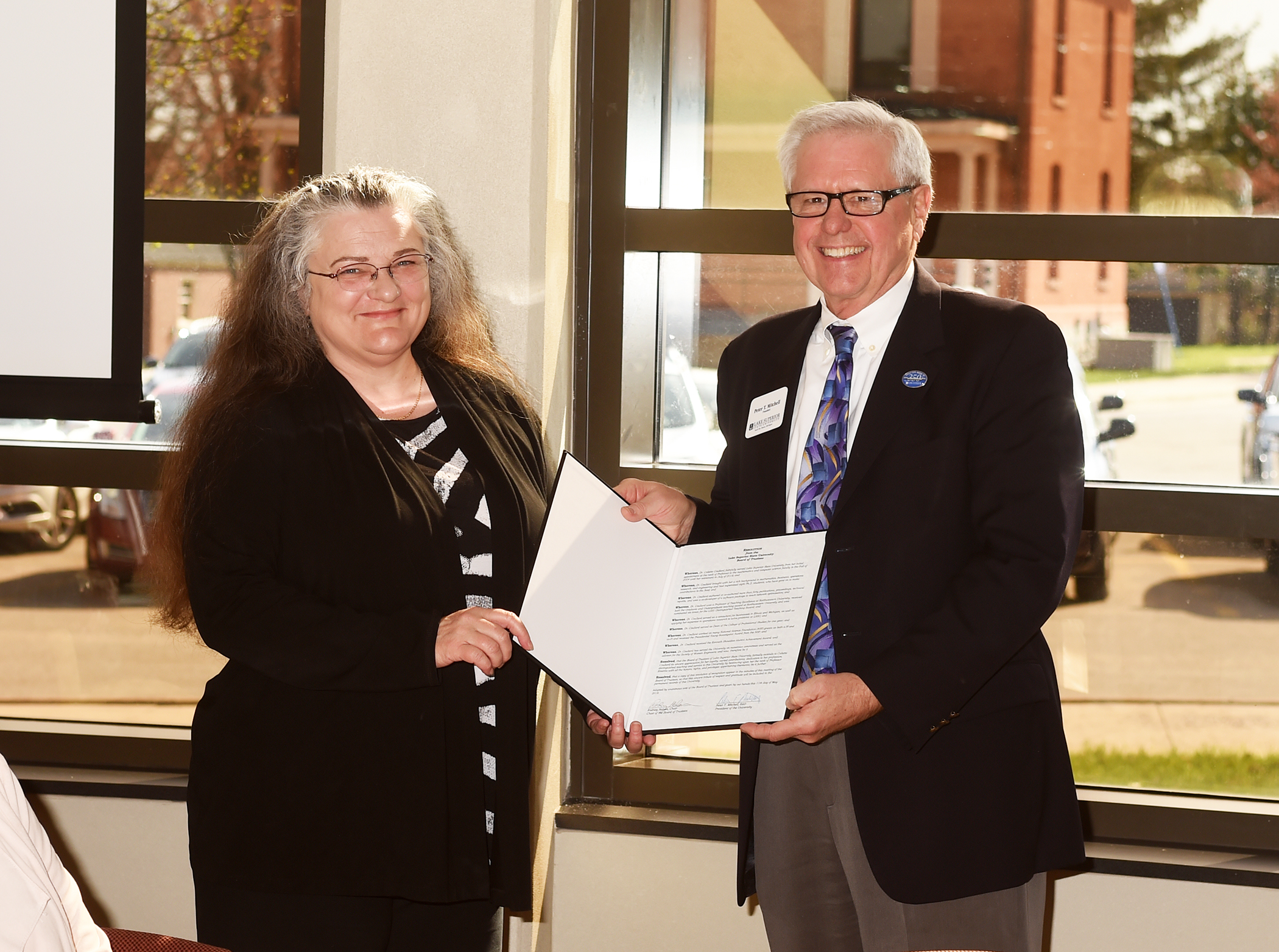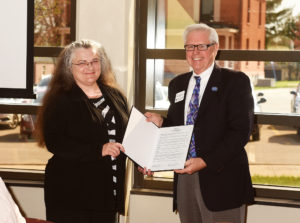
Lake Superior State University’s Board of Trustees approved a plan during its May 11 public meeting to convert James Norris Center’s natatorium area into a state-of-the-art court complex that will be used for volleyball, “eSport” events, and basketball.
The board also discussed enrollment and recruitment gains, voted to phase out six academic majors due to low enrollment within those majors, granted faculty emeriti and promotions, and recognized outgoing LSSU President Peter Mitchell and State Rep. Lee Chatfield with special board resolutions.
“We understand there will be valued members of the campus and Sault communities who will be affected by the closure of the pool,” said Mitchell. “Please know we tried several strategies that would retain the pool, but the combination of very high operating costs and impending renovation costs forced us to consider other options. As we explored these options, creative new opportunities emerged.”
Mitchell cited finances of keeping the pool open and federally-mandated parity between men’s and women’s sports as main drivers for the Norris space realignment initiative, the details of which will be defined in the coming months.
[su_quote cite=”Peter T. Mitchell, LSSU President” ]Although state-of-the-art at the time of construction, the swimming pool is not the proper size for intercollegiate sports. Utilities, maintenance, supplies, and lifeguard costs total $140,000 annually, with pressing renovations estimated to cost close to $500,000 required over the next two to three years.[/su_quote]
A recent assessment by the federal Office of Civil Rights (OCR) found that LSSU had no comparable program for women as with the NCAA Division I men’s hockey team.
“Our decision supports women’s athletics, specifically focusing on volleyball as a premier Division II sport at LSSU,” Mitchell said.
Plans call for the natatorium to be closed July 31 for transformation into a surfaced area for volleyball, basketball, and intramurals. There will also be an extensive renovation and expansion of locker rooms for teams and the general public along with the creation of lofts – similar to Taffy Abel – with one side overlooking the new volleyball court and the other side overlooking the Bud Cooper Gymnasium.
Finally, an area for eSports will be created at the far end of the volleyball court. These are participatory competitions played on a screen the size of a wall, with bleachers for fans to watch.
“eSports are growing exponentially with both players and spectators,” said Mitchell. “The 20,000-seat Los Angeles Forum – home of the L.A. Lakers – sold out in three hours for a major match. eSports are great winter activities, plus our strong computer science and engineering programs will attract gamers, thereby increasing the excitement while aiding in increasing student enrollment.”
Mitchell added that the Norris Center decision came by recommendation from a University task force and then communicated to a group of community leaders representing the city, school district, recreation, and economic development.
“Sault CVB Executive Director and the Soo’s greatest cheerleader, Linda Hoath, is already working with LSSU Athletic Director David Paitson on attracting basketball and volleyball tournaments to the Norris Center,” said Mitchell. “This will be great venue for volleyball teams from throughout the Upper Peninsula, Lower Peninsula, and Ontario for tournaments and practice and creating a new revenue stream for LSSU.”
In other business, the board voted to temporarily suspend six academic majors in communication, fish health, sociology, marine science, history, and environmental health due to low enrollment. No other students will be added as to these majors, while those currently enrolled will finish studies without impact. The temporary suspension enables the programs to be reinstated when enrollment demand increases.
A bachelor’s degree, one of the few in the country, in robotics engineering will start in the fall. The board also reestablished an integrated science major within the School of Education, to meet the demand for teachers with this special certification.
The board granted emeritus status to longtime engineering professor David McDonald, early childhood education professor Shirley Schoenemann, and math professors Collette Coullard and Lorraine Gregory.

Gregory, who started in the fall of 2003 in math and education, used both her education and her K-12 teaching experience to train and mentor LSSU’s pre-service teachers. She served as liaison between the School of Mathematics & Computer Science and the School of Education, coordinated the assessment of and review of joint programs between the two schools, and played a major role in writing self-studies and program reviews for these programs to work toward accreditation. Gregory began the ongoing Pi Day Math Competition and coordinated its hosting by LSSU 2006-15 for regional middle school and high school students. She also retires June 30.
During his almost 45 years on campus, Dave McDonald played a key role in designing new courses to fill critical program needs, served as faculty advisor for numerous senior projects, and was active in maintaining the assessment for the School of Engineering and Technology. He also authored or assisted with procuring over $750,000 worth of grants, including several National Science Foundation (NSF) grants for over $100,000 each, which were critical for maintaining programmatic accreditation.
Schoenemann started Lake Superior State University’s Child Care Center in 1983, going on to teach early childhood education (ECE) until her retirement in 2012. Her work incorporated developmental reading, science, and children’s literature into a wide range of teaching programs at LSSU. She supervised practicum students at the Child Care Center, which resulted in more than 40 ECE graduates employed throughout the Eastern Upper Peninsula. Her legacy continues through partnerships formed between LSSU and the Eastern Upper Intermediate Peninsula School District (EUPSID).
The board also promoted assistant professor of biology Martha Hutchens to associate professor. Hutchens was praised for a range of activities that bring K-12 students to campus for enrichment activities, such as camps. She was also involved in the award of a National Science Foundation grant to buy a Nuclear Magnetic Resonance (NMR) spectrometer, on which she continues to be a co-principal investigator and was the driving force in securing accreditation for the Medical Laboratory Science degree from the National Accreditation Agency for Clinical Laboratory Sciences (NAACLS).
The board also presented special proclamations to outgoing President Peter Mitchell and State Rep. Lee Chatfield.
Upon completion of his term on June 30, Mitchell will gain the title President Emeritus in recognition and gratitude for his service to Lake Superior State University.
In other action, trustees heard reports from Interim Admissions Director Lauren Paitson that applications were up 114% over last year, with students accepted for admission up 128%. If current trends hold until August, the total incoming headcount for fall could be up 140 students, which would tip total enrollment to comfortably more than 2,000. Mitchell reminded everyone that LSSU’s four-year goal is 2,500.
Vice President for Finance Morrie Walworth introduced the Performance Contract submitted by Johnson Controls (JCI) to address decades of deferred maintenance and to upgrade safety and security on campus. He reported that JCI has spent over 4,000 hours analyzing the situation, identified over 1,200 actions to take and provided eight options for LSSU.
Close to five hours were spent reviewing the options on Thursday with the final recommendation being that a subcommittee of trustees Barch, Pingatore, and Steensma were empowered to execute a final contract not to exceed the cost outlined in Option A, which was the most aggressive option to address all major needs all at once.
Several conditions were added as due diligence prior to signing the final contract such as assessing the impact of the performance contract on a potential P3 to construct new dorms, secure a financial advisor to review the JCI Performance Contract agreements, a comprehensive legal review of all documents associated with the Performance Contract by a third party law office, secure bond counsel, select an underwriter, and hire a trustee/fiscal Agent. These items must be addressed immediately so that once the final decision is made, JCI can begin the project, ideally no later than June 1, 2018.